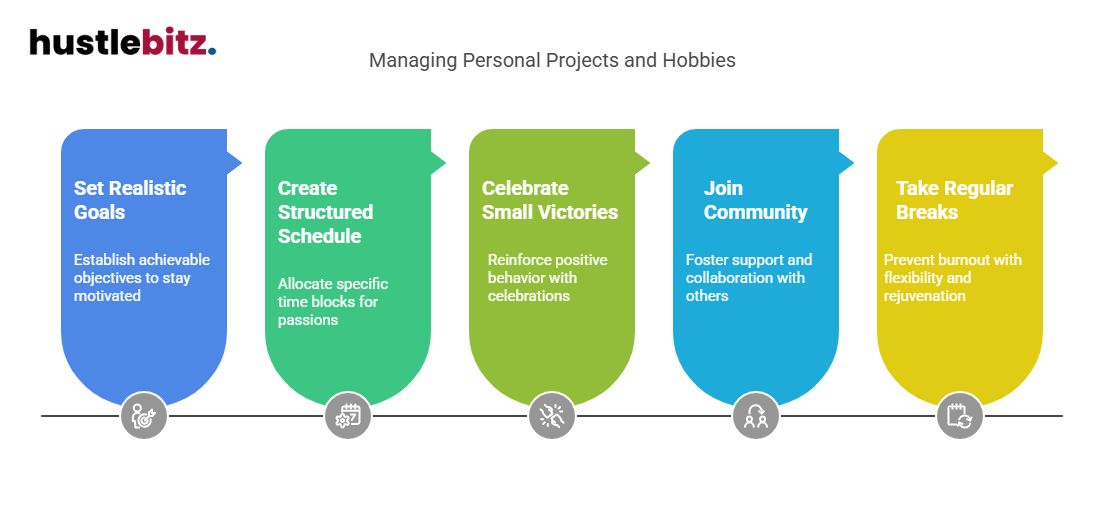Motivating yourself for personal projects and hobbies involves creating a structured plan that emphasizes time management and intrinsic motivation. Begin by setting achievable goals and breaking tasks into manageable segments. This approach not only sustains enthusiasm but also helps combat hobby burnout. Engage in regular progress tracking to celebrate small victories, reinforcing your commitment. Consider community involvement for added support and accountability. Maintaining flexibility in your schedule can also rejuvenate creativity and prevent feelings of overwhelm. Discovering new techniques and strategies can further enhance your passion projects, leading to a more fulfilling engagement that cultivates lasting motivation.
Key Takeaways
- Set realistic and achievable goals to maintain motivation without feeling overwhelmed by your personal projects and hobbies.
- Establish a structured schedule to allocate specific time blocks for engaging deeply in your passions.
- Celebrate small victories along the way to reinforce positive behavior and sustain enthusiasm for your pursuits.
- Join a community or group with shared interests to foster support, accountability, and collaboration in your projects.
- Take regular breaks and allow flexibility in your plans to prevent burnout and rejuvenate your creativity.

Balancing Work and Passion
How can one effectively balance the demands of a professional career with the pursuit of personal passion projects? Achieving this balance is essential for those who seek not only to excel in their careers but also to cultivate their creative outlets.
Time management emerges as a critical skill, enabling individuals to allocate dedicated blocks of time for both work tasks and personal endeavors. By prioritizing tasks and creating structured schedules, one can carve out moments for passion projects without compromising professional responsibilities.
Work-life integration is a concept that encourages blending professional and personal pursuits harmoniously. This approach allows for the seamless transition between work commitments and leisure activities, fostering a more fulfilling lifestyle. For instance, integrating creative projects into daily routines can enhance productivity, as engaging in passion projects often rejuvenates the mind and inspires fresh ideas.
Moreover, recognizing the importance of leisure activities is vital for maintaining overall well-being. Allocating time for hobbies and personal interests not only serves as a form of self-care but also contributes positively to mental health.
Building Sustainable Motivation

Balancing work and personal passions not only requires time management but also a strategy for building sustainable motivation that can keep individuals engaged in their projects over the long term. To achieve this, it is essential to foster intrinsic motivation—an internal drive that fuels your passion for the work itself. This can be complemented by incorporating external accountability, such as sharing your goals with friends or joining a community of like-minded individuals.
Mindset shifts are crucial in this journey. Transitioning from a fixed to a growth mindset allows you to view challenges as opportunities rather than obstacles. Recognizing emotional rewards is equally important; celebrating small victories can create a positive feedback loop that encourages continued effort.
To effectively manage your time while pursuing personal projects, consider the following strategies:
- Set realistic and achievable goals to provide direction.
- Break tasks into smaller, manageable segments to avoid overwhelm.
- Schedule dedicated time for your hobbies, treating them as important appointments.
- Reflect regularly on your progress to reassess and adjust your approach.
- Embrace flexibility, allowing your interests and passions to evolve naturally.
Overcoming Hobby Burnout

As individuals immerse themselves in personal projects, they may encounter hobby burnout, which can diminish their enthusiasm and creativity over time. This phenomenon, often manifesting as hobby fatigue, can lead to a lack of motivation and a pervasive sense of project overwhelm. When the initial excitement fades, one might experience a creative block that stifles innovative thinking and problem-solving.
Hobby burnout can also be characterized by passion fatigue, where the very activities that once inspired joy now feel like chores. This shift can create an inspiration drought, leaving individuals feeling drained and uninspired. To combat these challenges, it is essential to recognize the signs of burnout early and implement strategies to rejuvenate one’s creative spirit.
One effective approach is to take a deliberate break from the project, allowing for mental reset and emotional distance. Engaging in different activities unrelated to the hobby can also spark new ideas and perspectives, reigniting the original passion. Moreover, setting realistic goals and maintaining a flexible schedule can help to alleviate feelings of project overwhelm, making the process more enjoyable rather than burdensome.
Ultimately, overcoming hobby burnout requires self-awareness and intentionality. By acknowledging the signs of fatigue and taking proactive steps to refresh one’s creative energy, individuals can reclaim their enthusiasm and continue to explore their passions with renewed vigor. Embracing this journey is essential for maintaining the freedom and joy that personal projects are meant to provide.
Boosting Personal Project Drive

Many individuals find that establishing a structured routine can significantly enhance their drive for personal projects. A well-organized schedule allows for better time management, ensuring that creative exploration is not overshadowed by daily distractions. When you prioritize your personal projects, you create a space for personal inspiration to thrive, leading to more fulfilling outcomes.
To effectively boost your drive for personal projects, consider the following strategies:
- Set clear objectives: Define what you want to achieve with your projects to maintain focus and direction.
- Allocate specific time blocks: Dedicate uninterrupted time for project planning, allowing for deep engagement and skill development.
- Embrace flexibility: While structure is essential, allow yourself the freedom to adapt your plans when inspiration strikes.
- Incorporate variety: Diversify your projects to keep your creative juices flowing and prevent monotony.
- Celebrate small wins: Acknowledge your progress, no matter how minor, to reinforce motivation and inspire further effort.
Setting Achievable Hobby Goals
Establishing achievable hobby goals is essential for maintaining motivation and ensuring consistent progress in personal projects. By setting clear and realistic objectives, individuals can harness their creativity and passion without feeling overwhelmed. Utilizing goal visualization techniques can help clarify aspirations, making them more tangible and relatable.
To support your journey, consider implementing hobby tracking systems that allow you to monitor your progress and celebrate small victories. This aligns well with incremental progress methods, emphasizing the importance of taking manageable steps toward larger goals.
Effective time management strategies also play a crucial role in balancing hobby pursuits with daily responsibilities. Scheduling dedicated time for your hobbies helps prevent burnout and keeps your enthusiasm alive.
Additionally, establishing accountability partnerships can provide external motivation. Sharing your goals with a friend or joining a community of like-minded individuals fosters a sense of commitment and encouragement.
Here’s a simple framework to guide your goal-setting process:
| Goal Type | Action Steps | Timeline |
| Skill Development | Enroll in a class | 3 months |
| Project Completion | Dedicate 2 hours weekly | 6 weeks |
| Creative Exploration | Try a new technique | Monthly |
| Community Engagement | Join a local group | Ongoing |
| Personal Reflection | Maintain a hobby journal | Weekly |
Consistent Hobby Engagement

Consistent engagement in hobbies not only nurtures creativity but also enhances overall well-being and satisfaction in daily life. When individuals regularly invest time in their interests, they embark on a journey of hobby discovery and creative exploration that can lead to significant personal growth. This commitment fosters skill development while allowing for meaningful time allocation amidst the chaos of everyday responsibilities.
To cultivate this consistency, consider the following strategies:
- Set a Schedule: Designate specific times during the week for your hobbies, ensuring they become a non-negotiable part of your routine.
- Explore New Interests: Don’t hesitate to try new activities—this can reignite passion and open doors to hidden talents.
- Join a Community: Engaging with others who share your interests can provide support and motivation, enhancing your overall experience.
- Track Progress: Keep a journal or log of your activities to reflect on your journey and celebrate milestones, no matter how small.
- Balance and Flexibility: While consistency is crucial, allow for flexibility in your schedule to prevent burnout and maintain enthusiasm.
Final Thoughts
Staying motivated for personal projects and hobbies requires a thoughtful blend of structure, flexibility, and intrinsic motivation. By setting clear, achievable goals and tracking your progress, you can maintain enthusiasm and overcome potential burnout. Regularly engaging with like-minded communities for support, and ensuring your schedule accommodates both work and play, fosters a sustainable balance between personal and professional growth. Ultimately, the key lies in recognizing the joy and fulfillment that your hobbies bring and nurturing that passion with intentionality, creativity, and consistency.




